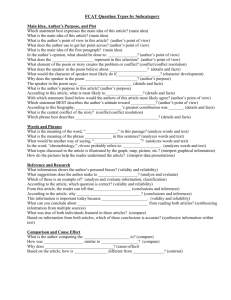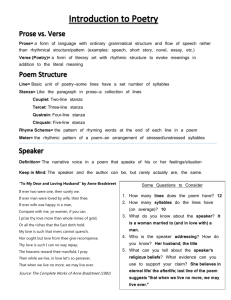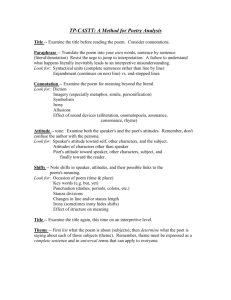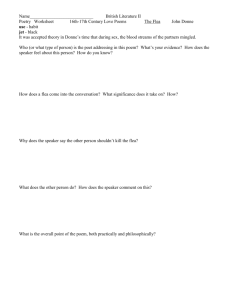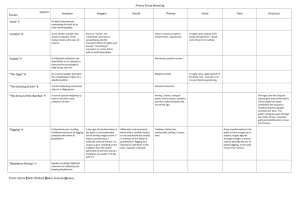Using TPCASTT for Analysis of Poetry
advertisement
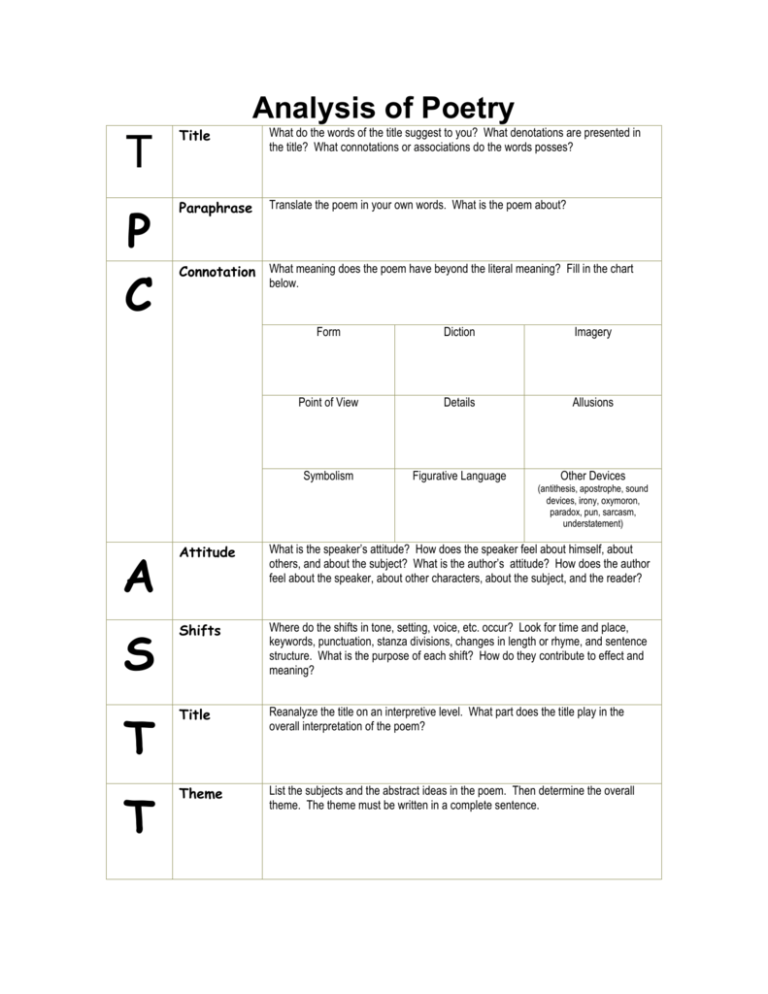
Analysis of Poetry T P C Title What do the words of the title suggest to you? What denotations are presented in the title? What connotations or associations do the words posses? Paraphrase Translate the poem in your own words. What is the poem about? Connotation What meaning does the poem have beyond the literal meaning? Fill in the chart below. Form Diction Imagery Point of View Details Allusions Symbolism Figurative Language Other Devices (antithesis, apostrophe, sound devices, irony, oxymoron, paradox, pun, sarcasm, understatement) A Attitude What is the speaker’s attitude? How does the speaker feel about himself, about others, and about the subject? What is the author’s attitude? How does the author feel about the speaker, about other characters, about the subject, and the reader? S Shifts Where do the shifts in tone, setting, voice, etc. occur? Look for time and place, keywords, punctuation, stanza divisions, changes in length or rhyme, and sentence structure. What is the purpose of each shift? How do they contribute to effect and meaning? T Title Reanalyze the title on an interpretive level. What part does the title play in the overall interpretation of the poem? T Theme List the subjects and the abstract ideas in the poem. Then determine the overall theme. The theme must be written in a complete sentence. APE Literature/Language/English 7/8 TPS-FASTT ANALYSIS-GRAPHIC ORGANIZER TITLE: Examine the title before reading the poem. Sometimes the title will give you a clue about the content of the poem. In some cases the title will give you crucial information that will help you understand a major idea within the poem. For example Anne Bradstreet's poem "An Author to Her Book", the title helps you understand the controlling metaphor. PARAPHRASE: Paraphrase the literal action within the poem. At this point, resist the urge to jump to interpretation. A failure to understand what happens literally inevitably leads to an interpretive misunderstanding. For example, John Donne's poem "A Valediction: Forbidden Mourning" is about a man who is leaving for a long trip, but if it is read as a poem about a man dying, than a misreading of the poem as a whole is inevitable. SPEAKER: Who is the speaker in this poem? Remember to always distinguish speaker from the poet. In some cases the speaker and poet might be the same, as in the autobiographical poem, but often the speaker and the poets are entirely different. For example, in "Not My Best Side" by Fanthrope, the speaker changes from a dragon, to a damsel, to a knight--none of these obviously are Fanthrope. FIGURATIVE LANGUAGE: Examine the poem for language that is not used literally. This would include, but is certainly not limited to, literary devices such as imagery, symbolism, metaphor, simile, allusion, the effect of sound devices (alliteration, onomatopoeia, assonance, consonance, rhyme), and any other devices used in a non-literal manner. Mr. Stout – C-114 The title suggests that Bennett’s poem will describe either a literal or figurative spill, or both. In the first three stanzas, the subjects are minor accidents or frustrations that occur every day: a leaking pipe, a spilled liquid, an unpleasant individual. After this, the poem introduces more complex and tragic issues on both a global and an individual scale, culminating in a suggestion of a final introspective struggle. Bennett’s speaker is an unknown persona, perhaps the poet himself. He acts as a guide to the reader’s innermost emotions – first by looking at our typical actions, and finally explicitly considering our struggles. Most significantly, the speaker addresses the reader directly, which encourages the audience to relate to the poem personally, rather than to approach it in a manner of cold observation. The controlling image of the piece is that referred to in the title and the refrain. Bennett’s spilled liquid evokes images of the “spilled milk” cliché, a petty mistake or inconvenience much like those described in the first half of the poem. Within the first three stanzas, the poet’s descriptives (e.g. “stupid broken spout” and “nasty little salesman”) connote frustration and anger, emotions which elevate in the following stanza to the uncontrollable anguish entirely disproportional to “a stain” or an “unwelcome chore.” In the process of shifting from petty events to more serious issues, Bennett creates a contrast that emphasizes their deeper significance and encourages introspection. For instance, the “disease” and “starving child” of stanza four are polar opposites in gravity to the “spout” and “salesman” of stanza two. The connection between the two are made ATTITUDE (or TONE): Tone, meaning the speaker's ATTITUDE towards the SUBJECT of the poem. Of course, this means that you must discern the subject of the poem. In some cases it will be narrow, and in others it will be broad. Also keep in mind the speaker's attitude toward self, other characters, and the subject, as well as attitudes of characters other than the speaker. SHIFTS: Note shifts in speaker and attitude. Shifts can be indicated in a number of ways including the occasion of poem (time and place), key turn words (but, yet, then, etc.), punctuation(dashes, periods, colons, etc.), stanza divisions, changed in line and stanza length, and anything that indicates that something has changed or a question is being answered. in lines 9 and 10, in which “it” (of the refrain) is implied to refer to man’s despair regarding modern society, which come through in the issues of small practical significance. Line 3 (the refrain) refines this concept, suggesting that this frustration lies in the failures man perceives in himself and others. The theme of personal failure is developed in lines 16 and 17 by the metaphor describing man’s selfimage. Beyond the connotations of simply the word “wretched,” the image of an individual as an “extra” connotes insignificance, a failure to be a true actor in life’s play, made all the more poignant by the extra’s “clinging to a prop” that represents his life. Bennett also transcends the individual in stanza five, to describe man’s despair at the state of humanity, “rotten to the core” and the ultimate transient and destructible nature of those things around us. In exploring the emotions of the reader, Bennett conveys the same emotions in his piece. The petty frustration of stanza 2, the haunting despair of stanzas four and five, and the self-contempt of the final stanza all come through in the poet’s diction and connection with the reader. Bennett’s subject, in a larger sense, is man’s despair as it emerges through life’s miniscule difficulties; as such, his poem is wholly pessimistic, eclipsing any mention of man’s happiness as a result of achievement. The primary shift within “Spilled” occurs between lines nine and ten, where the “it” of both refrains is defined, heralding the poet’s shift from the petty to the underlying struggles and significance of the former. By the end, Bennett’s perspective has become entirely introspective, as marked by the change in punctuation of the refrain at line 12: “It’s not the liquid spreading on the floor,” Bennett suggests, implying that man’s “sobs,” his despair, goes far deeper than practical significance, “But through a planet, rotten to the core.” The staining “liquid” of individual mistakes and humanity’s wider failures represent a broader specter than the shadows that occasionally cross our lives; rather, it is a pervasive influence that man witnesses all around him, and which is the cause for his discontent. TITLE: Examine the title again, this time on an interpretive level THEME: First list what the poem is about (subject) than determine what the poet is saying about each of those subjects (theme). Remember, theme must be expressed in a complete sentence. TPCASTT: “Spilled” is symbolic of the failures and frustrations that bring man to the aforementioned anguish, as well as to the more literal events which are the subject of the first half of the poem. The individual sees his own failures and humanity’s cruelties reflected in the microcosmic mistakes of our everyday lives, a perception which drives man to regret and despair. Poem Analysis Method: title, paraphrase, connotation, diction, attitude, tone, shift(s), title revisited and theme Title of poem means Paraphrase parts of the poem Connotation of some of the words – changing literal meaning to implied or associated values The title juxtaposes something supernatural and unexpected with the mundane, suggesting that the poem considers either the surprise of a “miracle” during a routine time of the day, or that the miracle in fact represents an unremarkable event. As such, Bishop’s miracle may be something relatively common, even base, but viewed from an unappreciated perspective. In Bishop’s poem, the speaker – along with a group of similar individuals – waits underneath a man’s balcony to witness his morning routine, as the sun just begins to rise over the river. When he finally emerges, the man is served a simple breakfast of a roll and coffee by a servant as he watches the sunrise. If interpreted literally, the speaker and his fellow men receive merely some crumbs and a few drops of coffee from the meal. The speaker describes an ornate house on the river as the sun continues to rise, before considering his own “mansion” and the “balcony” on which he relaxes each morning. In the envoi, the men finish their meager scraps and observe the flash of the sun on a window across the river. Bishop establishes contrast between the man on the balcony and the speaker which is integral to the meaning of her sestina. The situation in itself conveys a discrepancy in power or prestige: while the speaker’s group waits below, the man emerges on the balcony, “looking over [their] heads” as a servant tends to him. This scene evokes images of a ruler living in luxury and looking over his kingdom, “in the clouds” of royal concerns, as his subjects remain earth-bound and ignored. Parallelism and repetition in lines 16-17 and 21-23 further emphasizes the unequal resources of the two groups. Despite the speaker’s descriptions, “one lone cup of coffee” is understood to represent greater “wealth” than “one drop,” as is “one roll” more significant than “one rather hard crumb.” At other points, the crumbs and coffee become hyperbolic – “a loaf each, buttered” and “gallons” of it, respectively – implying either hopefulness or relativism on the part of the speaker. Bishop’s choice of simplistic end-words reflect especially upon the connotations of the “miracle” that is her subject, as do certain details. Although the speaker claims to be “waiting for the miracle,” they are simply “[standing] around,” which implies a casual apprehension. Similarly, the man’s breakfast is described as “the makings of a miracle,” although it is, in the traditional respect, unremarkable. This apparent paradox between the denotative and connotative meanings of “miracle” is underscored in line 25, when the speaker suggests that the sunrise and the accompanying scene “is not a miracle,” and then in line 32, when he states that this home has been “made for me by a miracle, / through ages, by insects, birds, and the river / working the stone” – implying the miraculous forces of nature. The contradiction with readers’ earlier understanding of the miracle is caused by the use of different contexts of the word in these respective lines. As a whole, the scene illustrates a relatively unremarkable scene – the routine of an unknown man, the sun rising over the river – which holds great significance only through a microscopic and meditative perspective. Attitude What is the attitude of the author, characters or yourself? The unknown speaker and his group are ambivalent towards the man they observe on the balcony. On one hand, they appear dependent upon the scraps left by the man from the balcony – “the charitable crumb” and the coffee which they “[lick] up” – although they are at times hopeful for more or dissatisfied by the remnants. In the second stanza, the group hopes “that the coffee would be very hot… and that the crumb / would be a loaf each, buttered,” yet what each man receives, in the fourth stanza, is nothing more than a “crumb” and a “drop of the coffee.” They understand that their hopes would only be met “by a miracle” (another different context of the word “miracle”), implying some degree of resignation in the nature of their plight. Their dissatisfaction is reflected in the speaker’s comment that “some flicked [the crumbs] scornfully into the river.” Despite their apparent strife, the group conveys little emotion in regards to the man on the balcony, save for the speaker’s outburst in lines 19-20. He suggests that he does not understand the elevated man’s manner. The presumably wealthy man appears preoccupied, removed from the “miracle” of the scene, for “his head [is] in the clouds.” After watching the moneyed man, the speaker reflects upon the scene as a whole, implying that there is a beauty in his sparse existence within nature. He describes “[my] crumb / my mansion, made for me by a miracle, through ages, by insects, birds, and the river / working the stone;” this evokes contrast with the luxury of the man on the balcony – manmade wealth versus that of natural beauty – and the speaker’s happiness with his existence. Furthermore, the same speaker who waits for “one drop of the coffee” drinks “gallons” on his own balcony “at breakfast time.” This paradox is resolved only by understanding coffee and the balcony to be symbolic and relative. Although the wealthy man may in fact enjoy a balcony, that of the speaker is a “balcony” in the sense that it is a home – likely naturalistic – which affords him a view of the “miracle” that is the sunrise over the river. The sum of these attitudes – meditation, resentment, hope, resignation – is an indication of the speaker’s possible identity. If the entire scene is understood to be a metaphor for the relationship between the privileged and the impoverished, the gathering is one of poor men who live by the riverside and must subsist on benefactors, willing or unwilling, like the man on the balcony. Shift At first we think or feel one way – then there is a shift: identify the shifts and explain them Title revisited Any new insights on meaning or significance of title? Theme There are conspicuous shifts in narrative focus and more subtle tonal shifts in Bishop’s piece. Stanzas one through four describe the interaction between the speaker’s group and the man on the balcony, the next two stanzas become more reflective as the speaker meditates upon his own humble and natural home in contrast to the other man’s villa, and the envoi returns to the crumbs and coffee, which the group “licks” up as if to conclude the scene. The shift at stanza five is introduced by line 25’s “I can tell what I saw next,” which introduces the next event in response to the “waiting” of the previous line. Considering the connotations of Bishop’s scene and word choice, the “miracle” may indeed refer to the miraculous – that is, in a naturalistic sense – sunrise. Although it is routine, the event has a grandeur apparently not lost on the speaker. He also refers to the moneyed man’s breakfast as “the makings of a miracle;” this suggests that it helps to set the tranquil scene. Bishop draws a distinction between the experience of the man on the balcony and the speaker in order to suggest that the latter, even in his impoverishment, is as connected to the “miracle” in consideration as the man living in luxury. In a broader sense, this is a scene with implicit social commentary: not only do the wealthy hold power over the poor, leaving them only scraps, but they are no more immersed in life than those without material wealth.



